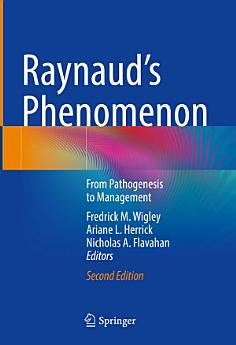Raynaud’s Phenomenon: From Pathogenesis to Management, Edition 2
About this ebook
This fully updated second edition comprehensively discusses various causes of Raynaud’s phenomenon including childhood Raynaud’s phenomenon, Raynaud’s phenomenon secondary to connective tissue disease, occupational causes, and a variety of other associated disorders. Careful consideration is given to the diagnosis of Raynaud’s phenomenon with state of the art discussion of nailfold capillary examination, non-invasive imaging, angiography, and appropriate serological testing. The concept that Raynaud’s phenomenon is associated with systemic disease or can be the manifestation of a systemic vasospastic disorder is also presented. In addition to reviewing both non-drug and drug therapy for patients with Raynaud’s phenomenon, this volume provides a practical approach in specific clinical situations by presenting problematic cases and the authors’ expert opinions on therapy. It also discusses mechanisms contributing to the vascular dysfunctionof primary Raynaud’s phenomenon and the vascular disease of secondary Raynaud’s phenomenon.
Engaging readers with case vignettes and a plethora of visual aids, Raynaud’s Phenomenon: From Pathogenesis to Management is a state-of-the-art, authoritative reference and invaluable contribution to the literature that will be of interest to adult and pediatric physicians, rheumatologists, and clinical and basic researchers.
About the author
Fredrick M Wigley has specialized in studies related to systemic sclerosis (scleroderma) and Raynaud’s phenomenon for over 30 years and has vast experience in managing patients with Raynaud’s. He is an author on over 250 peer-reviewed manuscripts. He has been Associate Editor of Arthritis and Rheumatology and principal author of the in Raynaud’ section in Up-to Date. He was given the American College of Rheumatology (ACR) Distinguished Clinician Scholar Award in 2009 and was recognized as a Master by the ACR in 2011.
Fredrick M. Wigley, M.D.
Johns Hopkins University
School of Medicine
Baltimore, MD
USA
Ariane L. Herrick, M.D., FRCP
Division of Musculoskeletal and Dermatological Sciences,
The University of Manchester,
Manchester,
UK
Nickolas Flavahan is a professor of anesthesiology and critical care medicine at the Johns Hopkins University School of Medicine. His research has focused on elucidating the cellular interactions and subcellular signalling pathways that control normal vascular function and those that regulate the initiation of vascular disease. He has spent a large part of his career investigating the cutaneous circulation, uncovering numerous aspects of its unique biology including the molecular mechanisms underlying cold-induced vasoconstriction.
Nicholas Flavahan, Ph. D.
Johns Hopkins University
School of Medicine
Baltimore, MD
USA





